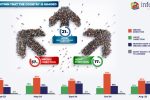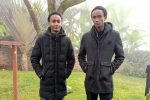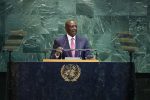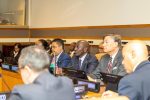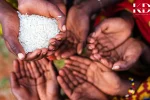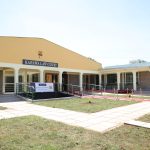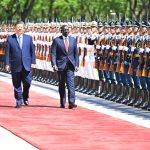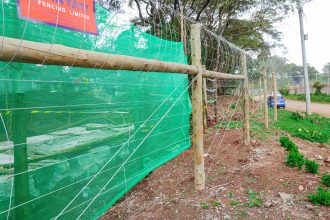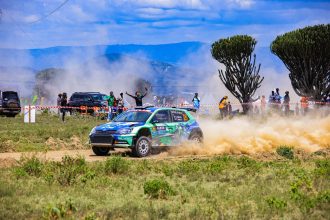Turkana County, a semi-arid region in northwestern Kenya, faces severe water scarcity, with an average annual rainfall of just 200mm—less than 20 days of rain per year.
For the 1.5 million residents of Turkana County, access to reliable water is a constant struggle.
The Lutheran World Federation (LWF) Kenya-Somalia Country Program, active in the region for over 30 years, has been working to address this challenge through sustainable, climate-resilient initiatives.
A Shift to Solar-Powered Solutions
LWF, in collaboration with local stakeholders, has established three netshed farming sites in Kakuma Municipality—Nakoyo, Dash and Dash —to promote climate-resilient agriculture.
Initially, windmills were used to pump water from boreholes, but their unreliability led to frequent water shortages.
Transitioning to solar-powered pumps has been transformative, ensuring a consistent water supply for farming and community use.
Paul Esinyen, a 38-year-old farmer and secretary of the water management committee, shares his experience: “Before, we depended on the windmill, but the wind was never reliable. With the solar system, we are sure of getting water every day as long as the sun shines for 2 to 3 hours. It’s a game-changer for us farmers, especially during the dry seasons.”
The solar pumps fill a 50,000 m³ tank daily, providing water for the community and nearby institutions for 2–3 days. This reliability has empowered farmers to focus on productive activities, improving food security and livelihoods.
Community Ownership and Sustainability
The water management committee, trained by LWF, plays a crucial role in ensuring the project’s success.
Members oversee the pump’s operation, collect small contributions for maintenance, and monitor usage to prevent breakdowns. Contributions fund security guards and a plumber, ensuring the system runs smoothly.
“The committee has made sure everyone follows the schedule. The project is running smoothly, and we all benefit. The solar system is reliable, affordable, and easy to manage,” Esinyen added.
Challenges and Aspirations
While the solar pumps have been transformative, some Turkana community members, like Craz Atelej, a 48-year-old farmer from Nakoyo, highlight the need for expansion: “The water pump has enabled us to farm and support our families. But with only five solar panels, we need more to pump enough water for the entire community.”
With funding from partners; Danish Church Aid, Australian Lutheran World Service, and Act Church of Sweden, LWF has not only provided water but also diversified income sources for the community. Farmers now sell crops from the netsheds, using the proceeds to educate their children and improve household nutrition.
This initiative aligns with LWF’s global strategy to build resilience by safeguarding assets, developing capacities, and promoting climate-smart activities.
The solar-powered water pumps are a testament to how sustainable technology, combined with community ownership, can transform lives in even the most challenging environments.

